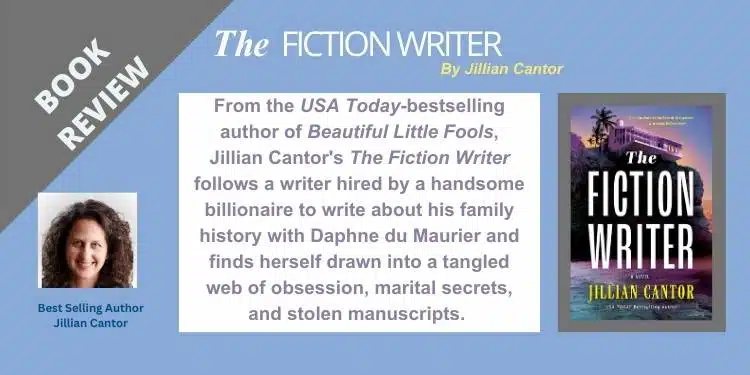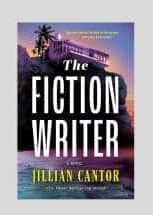Review by Ellen Blake
This month’s pick of the month from Andrea Peskind-Katz from GREAT THOUGHTS, GREAT READERS is The Fiction Writer by Jillian Cantor
What is The Fiction Writer About?
The Fiction Writer is a gothic mystery story about a fiction writer hired as a ghostwriter. It’s a novel that questions the delicate balance between inspiration and creative thievery. With a book within a book construct, Cantor cleverly reworks the classic, “Rebecca” by Daphne du Maurier.
Olivia Fitzgerald’s life is a mess. Her long-term boyfriend moved out, her third book was a disaster, and she has a bad case of writer’s block, preventing progress on her fourth. Desperate for money and inspiration, she jumps at a lucrative opportunity to ghostwrite a novel for the reclusive billionaire, Henry “Ash” Asherwood. Before she knows it, Olivia is on a plane flying to the other side of the country, happy to leave her struggles back home.
Upon her arrival, Olivia meets Ash, an incredibly handsome widower who won the title of “Sexiest Man Alive” twice from “People” magazine. She learns that he hired her to write his grandmother’s story, insisting that the book, Rebecca, was stolen from her. When Olivia starts to dig into the history, she finds that the more she learns, the more questions she has. There are obviously many secrets and doubts lurking behind every door. And the request to write another version of Rebecca seems connected in some way to the suspicious circumstances of Ash’s wife’s death.
Ash is reluctant to answer questions about his grandmother’s life and why he believes du Maurier stole her story. Furthermore, he seems far more interested in Olivia than in their writing project. There is also a peculiar housekeeper who is a cousin of Ash’s deceased wife. Supernatural sightings and other strange happenings in the large creepy mansion add to the suspense of this page-turner. As Olivia digs into the family’s history, she finds herself trapped in a mysterious story of her own.
My Review of “The Fiction Writer”
The Fiction Writer mirrors du Maurier’s novel, “Rebecca”, which serves as an inspiration for several of the characters and their interactions. For example, both stories take place in mansions, but instead of the story being set in a mansion in Cornwall, in The Fiction Writer, it’s set in Malibu. Furthermore, there exists a growing undercurrent of attraction between Olivia and Ash that strangely parallels the classic novel. It’s important to note you need not have read the original Rebecca to enjoy this book, as Cantor provides all the information you need. She also offers facts about both the publishing world and du Maurier throughout the novel that I found very interesting.
Interspersed in the chapters that unfold are excerpts from “The Wife”, which seem to offer another version of the story, though it’s unclear who is responsible for this narration. These excerpts seem to demonstrate that people are allowed to tell someone else’s story. In fact, some people see Rebecca as a retelling of Jane Eyre. When is it acceptable to use someone else’s story? When is it considered plagiarism? Are there any unique ideas left in the world? Mark Twain said there is no such thing as an original idea. He said that we can turn old ideas into new and provocative combinations, but they are in reality “the same old pieces of colored glass that have been in use through all the ages.”
The Fiction Writer has a fast-paced multi-layered plot told in the present day with flashbacks to the past taken from Ash’s grandmother’s journal. I enjoyed the portrayal of Olivia and found her totally relatable. It was interesting to watch her character grow, becoming stronger and more self-reflective throughout. The secondary characters are engaging and well-developed as well, though all seem suspicious in their own way, making it hard to know who to trust.
This book is a clever story that’s equal parts retelling and original storyline. It’s an engrossing tale that includes a little bit each of mystery, suspense, drama, and romance. Thought-provoking, the story left me thinking about the boundaries of creative freedom long after I finished the book.
Jillian Cantor is a master at writing books about historical fiction, and books about books, and The Fiction Writer doesn’t disappoint. Highly recommend! Another great read by Cantor in this vein is Beautiful Little Fools, which offers a different perspective of The Great Gatsby by F. Scott Fitzgerald.
I received a copy of The Fiction Writer from Harper Collins in exchange for an honest review.
About the Author: Jillian Cantor

Jillian Cantor has a BA from Penn State University and an MFA from the University of Arizona. She is known for her works in historical and contemporary fiction and many of her novels showcase her interest in historical events and figures. For example, “The Lost Letter” is set in Austria during World War II, and “The Hours Count” revolves around the lives of Julius and Ethel Rosenberg during the McCarthy era. She is a USA Today and internationally bestselling author of 11 novels for teens and adults. Her books have been chosen for Indie Next, Library Reads, and Amazon Best of the Month, and translated into 13 languages. Cantor grew up in the Philadelphia area and now lives in Arizona with her husband and two sons.
Other Books by Jillian Cantor
Here are some of Jillian Cantor’s other novels along with brief descriptions.
“The September Sisters” (2009)
This is Cantor’s debut novel, a contemporary young adult novel that explores the complicated relationship between two sisters, Abigail and Becky, over the course of a summer.
“The Life of Glass” (2010)
Another young adult novel, “The Life of Glass” delves into themes of friendship, love, and the challenges faced by adolescents. The story revolves around the friendship between two girls, Melissa and Nicole.
“The Transformation of Things” (2010)
In this novel, Cantor explores the lives of two women—Alice, a photographer in the 1920s, and Dana, a divorced mother in contemporary times. The narrative weaves together their stories, exploring themes of love, loss, and self-discovery.
“The Hours Count” (2015)
Set in the 1950s during the Red Scare, “The Hours Count” revolves around the lives of Julius and Ethel Rosenberg, who were accused of espionage and executed. The story is told from the perspective of a neighbor, Millie Stein, and explores the impact of McCarthyism on the lives of those around the Rosenbergs.
“Margot” (2013)
“Margot” is a reimagining of the life of Anne Frank’s sister, Margot Frank. The novel explores what might have happened if Margot survived the Holocaust and went on to live a life in the United States under a different identity.
“The Lost Letter” (2017)
This historical novel is set in Austria during World War II. The story follows the lives of a stamp engraver and his apprentice, exploring themes of love, loss, and the impact of war.
“In Another Time” (2019)
This sweeping historical novel that spans Germany, England, and the United States and follows a young couple torn apart by circumstance leading up to World War II—and the family secret that may prove to be the means for survival.
“Beautiful Little Fools” (2022)
A captivating novel that reimagines and expands upon F. Scott Fitzgerald’s literary classic, The Great Gatsby. Set against the backdrop of the glittering Jazz Age in 1922, the story unfolds through the alternating voices of three women:
About Andrea Peskind Katz from Great Thoughts, Great Readers:
 Andrea Peskind Katz runs Great Thoughts, Great Readers, a Book Salon presented via her private FB group where approximately 5,000 prolific readers and authors interact. To quote Robert Frost, she created her “second act” career to “unite my avocation and my vocation”. After 20 years in high-pressure sales, Andrea retired to spend time doing what she loves best: hanging with her family and reading good books.
Andrea Peskind Katz runs Great Thoughts, Great Readers, a Book Salon presented via her private FB group where approximately 5,000 prolific readers and authors interact. To quote Robert Frost, she created her “second act” career to “unite my avocation and my vocation”. After 20 years in high-pressure sales, Andrea retired to spend time doing what she loves best: hanging with her family and reading good books.












